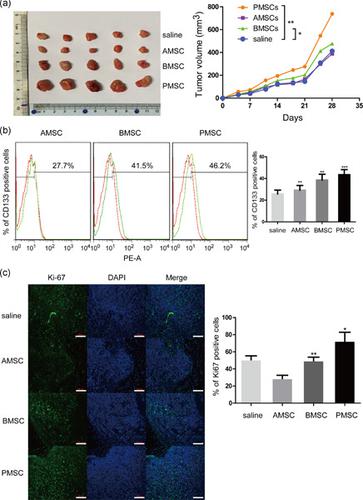当前位置:
X-MOL 学术
›
J. Cell. Physiol.
›
论文详情
Our official English website, www.x-mol.net, welcomes your
feedback! (Note: you will need to create a separate account there.)
IL‐8/CXCR2 mediates tropism of human bone marrow‐derived mesenchymal stem cells toward CD133+/CD44+ Colon cancer stem cells
Journal of Cellular Physiology ( IF 4.5 ) Pub Date : 2020-10-20 , DOI: 10.1002/jcp.30080 Xiaoying Ma 1 , Jingyun Chen 1 , Jiajun Liu 1 , Baixue Xu 1 , Xinyu Liang 1 , Xiaotong Yang 1 , Yun Feng 2 , Xin Liang 1 , Jianwen Liu 1
Journal of Cellular Physiology ( IF 4.5 ) Pub Date : 2020-10-20 , DOI: 10.1002/jcp.30080 Xiaoying Ma 1 , Jingyun Chen 1 , Jiajun Liu 1 , Baixue Xu 1 , Xinyu Liang 1 , Xiaotong Yang 1 , Yun Feng 2 , Xin Liang 1 , Jianwen Liu 1
Affiliation

|
In cancer treatment, the most attractive feature of mesenchymal stem cells (MSCs) is it's homing to tumor tissues. MSC is an important part of the “colon cancer stem cell niche”, but little research has been done on the tropism of human MSCs toward colon cancer stem cells (CCSCs). In this study, we first compared the effects of three tissue‐derived MSCs (bone marrow, adipose tissue, and placenta) in vivo on colon tumor xenograft growth. Then, we analyzed the tropism of bone marrow‐derived MSCs (BMSCs) toward normal intestinal epithelial cells (NCM460), parental colon cancer cells, CD133−/CD44−, and CD133+/CD44+ colon cancer cells in vitro. Microarray analysis and in vitro experiments explored the mechanism of mediating the homing of BMSCs toward CCSCs. Compared with the parental and CD133−/CD44− colon cancer cells, CD133+/CD44+ cells have a stronger ability to recruit BMSCs. In addition, BMSCs were significantly transformed into cancer‐associated fibroblasts after being recruited by CCSCs. After coculture of BMSCs and CCSCs, the expression of interleukin (IL)‐6, IL‐8, IL‐32, and CCL20 was significantly increased. Compared with parental strains, CD133−/CD44− cells, and NCM460, BMSC secreted significantly more IL‐8 after coculture with CD133+/CD44+ cells. Low concentration of IL‐8 peptide inhibitors (100 ng/ml) and CXC receptor 2 (CXCR2) inhibitors have little effect on the migration of BMSCs, but can effectively weaken CCSC stemness and promote dormant CSCs in the coculture system to re‐enter into the cell cycle. The endogenous IL‐8 knockout in BMSCs or BMSCs loaded with IL‐8 and/or CXCR2 inhibitors will make the therapy of BMSC targeting CCSCs function at its best.
中文翻译:

IL-8/CXCR2介导人骨髓间充质干细胞对CD133+/CD44+结肠癌干细胞的趋向性
在癌症治疗中,间充质干细胞(MSC)最吸引人的特点是它能够归巢到肿瘤组织。 MSC是“结肠癌干细胞生态位”的重要组成部分,但关于人类MSC对结肠癌干细胞(CCSC)的趋向性的研究还很少。在本研究中,我们首先比较了三种组织源性 MSC(骨髓、脂肪组织和胎盘)在体内对结肠肿瘤异种移植物生长的影响。然后,我们在体外分析了骨髓间充质干细胞(BMSCs)对正常肠上皮细胞(NCM460)、亲本结肠癌细胞、CD133 - /CD44 -和CD133 + /CD44 +结肠癌细胞的趋向性。微阵列分析和体外实验探索了介导BMSCs归巢至CCSCs的机制。与亲本和CD133 - /CD44 -结肠癌细胞相比,CD133 + /CD44 +细胞具有更强的募集BMSCs的能力。此外,BMSCs被CCSCs招募后显着转化为癌症相关成纤维细胞。 BMSCs与CCSCs共培养后,白细胞介素(IL)-6、IL-8、IL-32和CCL20的表达显着增加。与亲本株、CD133 - /CD44 -细胞和NCM460相比,BMSC与CD133 + /CD44 +细胞共培养后分泌明显更多的IL-8。低浓度的IL-8肽抑制剂(100 ng/ml)和CXC受体2(CXCR2)抑制剂对BMSCs的迁移影响不大,但能有效削弱CCSC的干性,促进共培养系统中休眠的CSC重新进入休眠状态。细胞周期。 BMSCs内源性IL-8敲除或负载IL-8和/或CXCR2抑制剂的BMSCs将使BMSCs靶向CCSCs的治疗发挥最佳功能。
更新日期:2020-10-20
中文翻译:

IL-8/CXCR2介导人骨髓间充质干细胞对CD133+/CD44+结肠癌干细胞的趋向性
在癌症治疗中,间充质干细胞(MSC)最吸引人的特点是它能够归巢到肿瘤组织。 MSC是“结肠癌干细胞生态位”的重要组成部分,但关于人类MSC对结肠癌干细胞(CCSC)的趋向性的研究还很少。在本研究中,我们首先比较了三种组织源性 MSC(骨髓、脂肪组织和胎盘)在体内对结肠肿瘤异种移植物生长的影响。然后,我们在体外分析了骨髓间充质干细胞(BMSCs)对正常肠上皮细胞(NCM460)、亲本结肠癌细胞、CD133 - /CD44 -和CD133 + /CD44 +结肠癌细胞的趋向性。微阵列分析和体外实验探索了介导BMSCs归巢至CCSCs的机制。与亲本和CD133 - /CD44 -结肠癌细胞相比,CD133 + /CD44 +细胞具有更强的募集BMSCs的能力。此外,BMSCs被CCSCs招募后显着转化为癌症相关成纤维细胞。 BMSCs与CCSCs共培养后,白细胞介素(IL)-6、IL-8、IL-32和CCL20的表达显着增加。与亲本株、CD133 - /CD44 -细胞和NCM460相比,BMSC与CD133 + /CD44 +细胞共培养后分泌明显更多的IL-8。低浓度的IL-8肽抑制剂(100 ng/ml)和CXC受体2(CXCR2)抑制剂对BMSCs的迁移影响不大,但能有效削弱CCSC的干性,促进共培养系统中休眠的CSC重新进入休眠状态。细胞周期。 BMSCs内源性IL-8敲除或负载IL-8和/或CXCR2抑制剂的BMSCs将使BMSCs靶向CCSCs的治疗发挥最佳功能。





















































 京公网安备 11010802027423号
京公网安备 11010802027423号